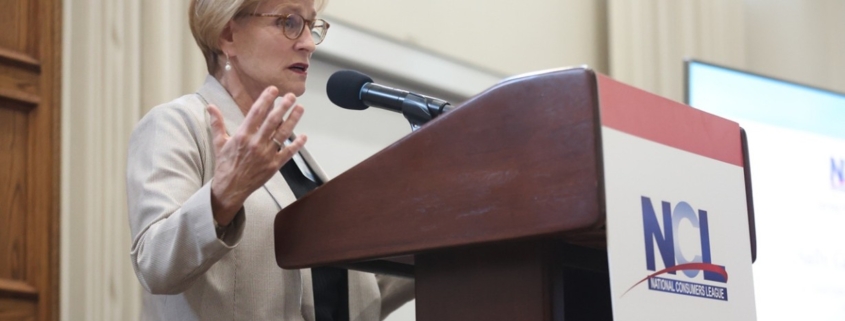Frances Perkins Is Rolling in Her Grave: Today’s Child Labor Rollbacks Are a National Shame
By Sally Greenberg, NCL CEO
America once swore we would never go back. Never again would children be robbed of their childhoods—or their lives—in sweatshops, factories, and slaughterhouses. That promise was won through the relentless efforts of Florence Kelley and Frances Perkins, pioneering leaders of the National Consumers League.
Kelley’s crusade began in childhood, when her father, a Pennsylvania Congressman, took her into steel and glass factories where she saw children her own age toiling under dangerous conditions. That early exposure fueled her career as a factory inspector, documenting abuses, and pushing for laws to ban factory work for children under 14.
Perkins shot into the political limelight in March 1911 in the wake of the Triangle Shirtwaist fire, which tore through a high-rise industrial building in Greenwich Village, killing 146 workers, most of them young immigrant women, some only 14 years old. The doors were locked to prevent theft. Perkins was working for the National Consumers League, and was visiting a friend nearby when the fire erupted and became an eyewitness to the disaster. She dedicated her life to ensuring children never again died—or lost their childhood—in pursuit of profit.
Years later, as Secretary of Labor (1933-1945) under President Franklin D. Roosevelt, Perkins helped structure the Fair Labor Standards Act (FLSA) of 1938, which banned most child labor and enshrined worker protections built on compassion and common sense.
Fast forward to 2025—and we’re tearing their legacies apart. Legislative efforts in Florida, Iowa, and Ohio in 2025 attempted to loosen child labor standards in opposition to the federal Fair Labor Standards Act. The media has been reporting for years about the widespread abuses in meatpacking, roofing, and manufacturing—jobs once legally off-limits to the youngest workers who are now given the “opportunity” to risk life and limb for their employers.
In Florida, lawmakers tried to gut protections for teens: bills like HB 1225 and SB 918, would allow 16- and 17-year-olds to work unlimited hours and days without meal or rest breaks—even during school—and open the door for 13-year-olds to work in summer months. The Governor’s office drafted the legislation and talking points for sponsors, revealing a coordinated effort to exploit child workers.
In 2023, Iowa openly defied the Fair Labor Standards Act, as legislators loosened limits on hazardous work, weakening work-permit requirements for 16- and 17-year-olds, in direct conflict with FLSA rules.
In Ohio, Republicans reintroduced legislation to allow 14- and 15-year-olds to work longer hours during the school year, in direct conflict with FLSA protections.
These aren’t just local outrages; they echo a national effort to rollback child labor protections. According to the Economic Policy Institute, since 2021, at least 28 states have introduced legislation to weaken child labor laws, and 17 have passed them. From 2015 to 2022, the number of minors employed in violation of child labor laws increased by 283% and the number of minors employed in violation of hazardous occupation orders increased by 94%.
Let’s be honest: this isn’t about kids receiving work experience. It’s about cheap labor replacing the immigrant labor we are losing, or so says Governor Ron DeSantis of Florida. Allowing minors to work longer hours—sometimes overnight, in dangerous jobs—diminishes their education, endangers their safety, and undermines their future earnings. It’s a race to the bottom, sanctioned by lawmakers, cheered on by corporations driving profits, and in some cases cloaked in deception as apprenticeships or workplace training at less than minimum wage.
Back on that clear Spring day in 1911, Frances Perkins watched in horror as young girls leapt from the burning Triangle Shirtwaist factory. She vowed never again—and built laws that put children’s safety above profit. But today, lawmakers are dragging us backward, gutting protections and treating children as disposable labor to feed corporate bottom lines. This Labor Day, we say no. No rollbacks. No to profiteers. No to products being produced with child labor. And, no to a United States where children are once again sacrificed for profit.


















